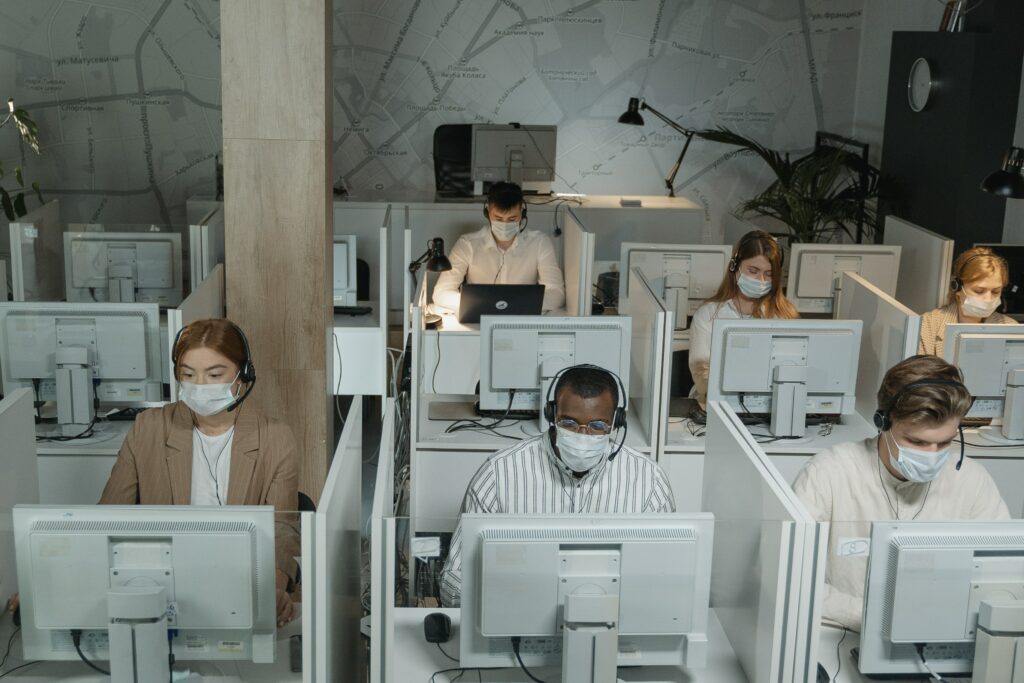In an ever-increasingly digital world, the dynamics of helpdesk staffing are continually evolving. With shifting trends in remote work, artificial intelligence, cybersecurity, and sustainability, the landscape of IT support services is undergoing significant transformation. Understanding and adapting to these trends is crucial for MSPs to remain competitive and deliver exemplary services.
We at Support Adventure, a staffing agency specializing in the MSP industry, stand as a testament to successfully navigating these changes. By leveraging the power of remote work and capitalizing on a global talent pool, we offer staffing solutions that meet the current needs and future trends of the industry. We emphasize the value of soft skills, diversity, sustainability, and social responsibility in our approach, proving that these elements are key to success in the modern helpdesk landscape.
In the upcoming sections, we will unpack each of these trends, exploring their implications and how MSP staffing agencies like Support Adventure are utilizing them to revolutionize the MSP sector. From delving into the shift towards remote working to understanding the growing importance of soft skills and diversity in IT support, this article provides an insightful look into the present and future of helpdesk staffing.
Whether you’re an MSP owner seeking to stay on the cutting edge, a helpdesk professional aiming to navigate the changing tides, or simply a curious reader interested in the evolution of the helpdesk industry when it comes to staffing, join us as we explore the transformative trends shaping the industry and how we, at Support Adventure, are navigating this dynamic landscape.
Embracing The Remote Working Culture: The IT Support Staffing Revolution
The COVID-19 pandemic necessitated a dramatic shift towards remote work, a trend that was already on the rise but was accelerated by global events. Even as normalcy gradually returns, many companies continue to embrace remote working models, and this has dramatically transformed the landscape of IT support staffing. According to a study by Global Workplace Analytics, it is estimated that 25-30% of the workforce will be working from home multiple days a week by the end of 2023.

The geographic limitations that once hindered the recruitment process are now irrelevant. IT support roles, which typically involve problem-solving, troubleshooting, and communication, can be fulfilled from any location with a stable internet connection. This shift has opened up a vast talent pool, allowing companies to recruit skilled IT support staff from across the globe. Gartner reported in a survey that 82% of company leaders plan to allow employees to work remotely at least some of the time, even post-pandemic. This trend is also beneficial for employees, offering greater flexibility and eliminating commute times.
However, this shift towards remote working isn’t without its challenges. It necessitates changes in management and communication practices. Building a strong remote working culture, fostering engagement, and ensuring efficient communication are now crucial aspects of IT support management. Companies need to invest in the right tools and technologies that facilitate effective remote collaboration and maintain productivity.
The remote working revolution is here to stay, and its implications for IT support staffing are profound. As businesses continue to navigate this new terrain, they need to adapt and innovate their strategies to attract, retain, and manage remote IT support staff effectively.
AI and Automation: Redefining the Role of IT Support Staff
In recent years, artificial intelligence (AI) and automation have made their way into the IT support realm, gradually reshaping the roles and responsibilities of support staff. These technologies have emerged as powerful tools to handle routine tasks, streamline processes, and increase efficiency. A ServiceNow report suggests that 45% of routine IT tasks can be automated, implying a significant shift in the function of IT support personnel.
Artificial intelligence, in particular, is proving transformative. With the advent of AI-powered chatbots and virtual assistants, many first-tier IT support tasks, such as password resets, system updates, or basic troubleshooting, can be automated. This not only ensures quick response times but also frees up the human IT support staff to tackle more complex issues that require human ingenuity and problem-solving capabilities. A McKinsey study predicts that generative AI could add up to $4.4 trillion of value to the global economy annually.

Moreover, AI can enhance IT support by providing predictive insights, helping prevent problems before they occur. Machine Learning algorithms can analyze data patterns and predict future IT issues, allowing support staff to act proactively rather than reactively.
Nevertheless, the integration of AI and automation in IT support is not about replacing humans but enhancing their capabilities. The technology is there to handle repetitive and high-volume tasks, allowing human staff to focus more on strategic, creative, and complex problem-solving activities that add value to the organization. Furthermore, they also need to work on managing and improving these AI systems, another task that requires a high level of skill and expertise.
The future of IT support, therefore, is not human or AI, but human and AI. The synergy of human intelligence with artificial intelligence has the potential to elevate the IT support function to new heights. As this technology continues to evolve, IT support staff will need to adapt and develop new skills to remain relevant in this changing landscape.
The Upskilling Imperative: Adapting to the Rapid Pace of Technological Change
As the technological landscape evolves at an unprecedented speed, the need for constant upskilling and retraining in the IT support sector has never been more urgent. Tech trends such as cloud computing, cybersecurity, machine learning, and data analytics are continuously evolving, and keeping pace with these changes is essential for IT support staff. According to a study by Infosys, 44% of employees believe that their current skill set will be obsolete within the next four to five years.
One of the key challenges lies not just in the pace of technological change but also in the increasing complexity and interrelatedness of different technological domains. Today, IT support staff are expected to have a grasp of a wide range of technologies. For instance, a support professional may need to understand networking protocols, database management, software development, and cybersecurity. This demand for interdisciplinary skills is transforming the IT support role into a multi-faceted one.
In this context, organizations need to invest in comprehensive upskilling programs for their IT support staff. They also need to encourage a culture of continuous learning and improvement. Various platforms, like Coursera, Udemy, LinkedIn Learning, and others, offer a wealth of resources for IT professionals seeking to expand their skillset.
Moreover, certification programs offered by organizations such as CompTIA, Cisco, and Microsoft are widely recognized in the industry and can provide IT support staff with the updated skills they need to excel in their roles.
As we navigate through the digital age, the ability to adapt and acquire new skills is a crucial factor for success in the IT support field. Professionals and organizations alike must recognize the upskilling imperative and take proactive steps to stay ahead of the curve.
Hybrid Helpdesk Models: Harnessing the Power of Flexibility and Expertise of Worldwide Remote IT Staff
In the evolving world of managed services, adaptability and cost-effectiveness are critical. Traditional in-house helpdesk models are gradually evolving to more dynamic approaches, with the hybrid model leading the way. This approach combines the benefits of in-house helpdesk staff with outsourced expertise, offering MSP owners a practical, flexible, and efficient solution.
The hybrid helpdesk model facilitates a strategic blend of internal and external resources. Maintaining an in-house helpdesk team ensures your MSP has staff who understand your unique business needs and culture. Simultaneously, outsourcing certain aspects of helpdesk services grants you access to specialized knowledge, advanced technologies, and round-the-clock support that might be challenging to manage with an in-house team alone. Recent research by CompTIA indicates significant growth in the MSP industry, highlighting an increased reliance on such services across businesses of varied sizes.
Outsourced helpdesk staffing is a very cost-effective approach for MSP owners. Instead of hiring full-time employees for every role, you can engage external services for specific needs, reducing overhead costs and streamlining operations. Furthermore, these external providers are consistently updated on the latest tech trends, allowing your MSP to benefit from their expertise without the need for constant in-house training.
Another advantage of this model is its inherent scalability. By leveraging outsourced helpdesk staffing, you can efficiently scale your helpdesk services based on demand. This adaptability is particularly beneficial for MSPs experiencing growth or those with fluctuating service requirements.
However, the successful implementation of a hybrid model requires strategic planning and management. Seamless coordination between in-house and outsourced helpdesk staff is crucial. This necessitates clear communication, alignment of objectives, and precisely defined roles.
In the fast-paced digital environment, the hybrid helpdesk model provides MSP owners with a practical, cost-effective, and adaptive strategy. As the MSP industry continues to expand, we anticipate more businesses will adopt this model, leveraging its unique advantages to optimize their helpdesk strategies.
Cybersecurity Focus: The Changing Landscape of Helpdesk Services in the MSP Industry
In an era where data breaches and cyber threats are increasingly common, cybersecurity has become a focal point in the managed services domain. This emphasis is redefining the role of helpdesk staff, requiring them not only to resolve technical issues but also to play an integral part in safeguarding organizational data.
The increasing complexity and sophistication of cyber threats necessitate that helpdesk staff possess a solid understanding of cybersecurity. They are often the first line of defense when it comes to identifying and responding to potential threats. A study by Ponemon Institute revealed that the average cost of a data breach in 2020 was $3.86 million, underscoring the high stakes involved.
For MSP owners, this means reevaluating the skills and knowledge required of your helpdesk team. It’s no longer sufficient for them to be versed in resolving hardware or software issues alone. Instead, they must also be proficient in recognizing and responding to cybersecurity threats, understanding protective measures, and being aware of compliance regulations.
Helpdesk staff play a crucial role in educating users about safe practices. They are often tasked with training staff on how to recognize phishing emails, manage passwords effectively, and adhere to safe internet practices. Thus, the role of the helpdesk has expanded to become a critical component in an organization’s overall cybersecurity strategy.
However, this increased focus on cybersecurity also presents a challenge. There is a well-documented skills gap in the cybersecurity sector, with Cybersecurity Ventures predicting 3.5 million unfilled cybersecurity jobs globally at least until 2025. This calls for MSP owners to invest in training and upskilling their helpdesk staff to meet this growing demand.
In today’s digital landscape, cybersecurity is not an optional add-on but a core component of helpdesk services. As cyber threats continue to evolve, the role of helpdesk staff in protecting organizational data is becoming increasingly important. MSP owners need to recognize this shift and equip their teams with the necessary skills and knowledge to face these challenges head-on.
Emphasizing Soft Skills: A Shift in Hiring Criteria of IT Staff
While technical proficiency has always been a prerequisite in the IT support sector, recent trends indicate a growing emphasis on soft skills in the helpdesk staff hiring process. In fact, qualities such as effective communication, problem-solving, and emotional intelligence are now considered just as crucial as technical expertise when it comes to selecting helpdesk staff.

This shift reflects the evolving role of helpdesk services. Helpdesk staff are no longer just problem solvers; they are also educators, collaborators, and communicators. They interact directly with users, guiding them through complex processes and helping them understand intricate systems. Their ability to communicate effectively, empathize with users, and maintain patience under pressure can significantly impact the user experience and, by extension, the reputation of the MSP.
Support Adventure recognizes the value of these soft skills and places a high emphasis on sourcing candidates who exhibit them. We take pride in our rigorous selection process, specifically targeting candidates with high English language proficiency and excellent communication skills. We understand that these attributes, coupled with technical know-how, make for an effective and successful helpdesk professional.
Yet, hiring is just the start. MSP owners also need to foster an environment that encourages the development of these soft skills. Training programs should include modules on communication, problem-solving, and empathy, alongside technical training. Performance evaluations should also take these soft skills into account, highlighting their importance in the role of helpdesk staff.
In an increasingly user-centric IT landscape, soft skills are becoming key differentiators in the helpdesk domain. They contribute not only to successful user interactions but also to a positive workplace culture, improved team collaboration, and enhanced customer satisfaction. As the role of helpdesk services continues to evolve, the importance of these soft skills will only continue to grow. Recognizing this trend, forward-thinking MSP owners are adjusting their hiring criteria and training programs to place a greater emphasis on these valuable skills.
Diversity and Inclusion: Enriching the Helpdesk Landscape
The IT sector has traditionally been viewed as lacking in diversity, but recent years have seen a concerted effort to change this narrative. The drive towards greater diversity and inclusion within helpdesk staffing is not just about representation; it’s about harnessing the myriad benefits that a diverse helpdesk workforce brings. These include a wider range of perspectives, increased creativity, and improved problem-solving, which can lead to superior service for customers.
At Support Adventure we try to take the lead in this regard by example. Our business model, which involves sourcing staff from across the world without discrimination, is a testament to our commitment to diversity and inclusivity. By doing so, we ensure a rich mix of perspectives, experiences, and skills that enhance our clients’ service delivery and company culture.
Diverse teams are more likely to understand and meet the needs of a varied client base. For instance, a helpdesk professional from a different cultural background might be better equipped to understand and address the needs of a client from that culture. Diversity also fuels innovation; when individuals from varied backgrounds collaborate, they bring unique perspectives that can lead to creative solutions to problems.
Inclusion, the other half of the equation, is just as crucial. It’s not enough to merely have a diverse workforce; MSP owners need to create an environment where all individuals feel valued, respected, and able to contribute to their fullest potential. This might involve implementing inclusive hiring practices, providing diversity and inclusion training, and ensuring that company policies and culture are inclusive.
Many organizations are making deliberate efforts to increase representation across different genders, ethnicities, and backgrounds. For example, companies are implementing mentorship programs to support underrepresented groups and are setting up diversity hiring goals.
In an increasingly global and diverse world, the need for diversity and inclusion in the helpdesk landscape has never been more apparent. Companies like Support Adventure are leading the way, demonstrating that a diverse and inclusive helpdesk workforce is not just a moral imperative but also a strategic advantage. As the helpdesk industry continues to evolve, embracing diversity and inclusion will be key to staying competitive and delivering top-notch service.






Future-Proofing Your Helpdesk: Harnessing Emerging Trends for Success
In conclusion, the rapidly changing landscape of helpdesk staffing is not to be underestimated. The emerging trends of remote work, AI and automation, cybersecurity, soft skills, diversity, and sustainability are not merely passing phases, but key indicators of the future of the IT support sector. By understanding and embracing these trends, MSP owners can position themselves at the forefront of the industry, delivering high-quality, modern, and forward-thinking services to their clients.
Support Adventure, with its innovative approach to global remote helpdesk staffing, has demonstrated that these trends can be successfully integrated into a viable business model. By focusing on both technical skills and soft skills, embracing diversity and inclusivity, and committing to sustainability and social responsibility, they have managed to stay ahead of the curve in this dynamic industry.
If you’re an MSP owner looking to navigate these changes, consider how your organization can adapt and evolve. How can you integrate remote work into your operations? How can your helpdesk staff provide better support in an increasingly digital and cyber-threatened world? What training can you provide to upskill your staff? How can you foster diversity and inclusivity within your teams? How can you contribute to a more sustainable future?
The time for change is now. If you’re looking to expand your helpdesk team, Support Adventure can provide you with the tools and services you need to succeed in the ever-evolving MSP landscape.
Reach out to us today on our MSP staffing services page and let’s shape the future of your helpdesk staff together!



0 Comments